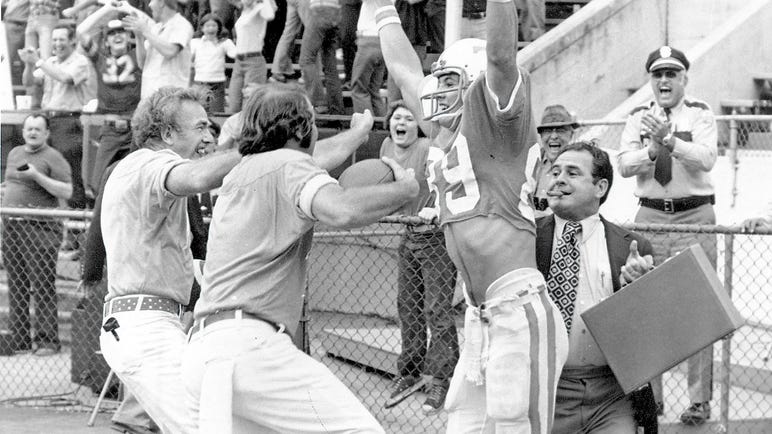Voting ended on Friday past for the College Football Hall of Fame.
More than 12,000 National Football Foundation members and current Hall of Famers had a month to make their picks. Their votes will be tabulated and submitted to the Honors Court for consideration. That secretive committee (Archie Griffin may be the chair) will deliberate and select the next class. It is not obligated by the votes.
Old Vols Larry Seivers and Willie Gault probably won’t make it.
“It’s an enormous honor to just be on the College Football Hall of Fame ballot, considering more than 5.62 million people have played college football and only 1,074 have been inducted,” said NFF president Steve Hatchell.
If my math is close, that looks like less than two one-hundredths of a percent of those who have played during the past 153 seasons end up as honorees. Two hundred thirty coaches have achieved Hall of Fame distinction. A famous one didn’t.
Just being considered means Gault and Seivers are truly among the greatest to have ever played the game. They had to be first-team all-Americans to begin the process. Joe Namath and Joe Montana aren’t in the Hall of Fame, and never will be, for that very reason.
Next step: Seivers and Gault had to win approval from a regional screening committee to get on the ballot.
That said, they may or may not have received enough votes to even get the final selection committee’s attention. And, their timing is off. Not so old Vol Eric Berry was anointed last year. He will be formally inducted this December. It appears the Honors Court has a “politically correct” tendency of trying to avoid “too many too fast” from the same schools.
That is not an iron-clad rule. And, there is nearly always next year. Eligibility runs out 50 years after the last game.
We’ll see if the not-so-fast inclination delays highly deserving Josh Heupel’s honor. The quarterback of Oklahoma’s 2000 national championship team was on the ballot. He was a consensus first-team All-American and Walter Camp player of the year. He was the Big 12 player of the year. He was runner-up for the Heisman Trophy.
Heupel gained most of the school’s passing records. He knew how to play.
The window may be open just enough for Josh. Former Oklahoma defensive back Roy Williams went into the hall in 2022. If Heupel is chosen, induction would be in December 2024.
Seivers, Tennessee’s all-time best possession receiver, 1974-76, captain as a senior, two-time consensus first-team All-American, still ranks sixth in school history in career reception yardage (1,924) and seventh in receptions (117). If you didn’t see him, do believe he caught everything he could touch.
Somewhere, there is a painting titled “Magic Hands.”
You get the idea? Officially, he dropped one pass in a three-year career. His most famous catch was the two-point conversion against Clemson.

Willie Gault
Gault played in the early 1980s. He was a step (or three) faster than Seivers. He set six SEC and 12 school punt /kickoff return records. He tied an NCAA record for most touchdowns by kick return with three in 1980.
Willie scored 15 touchdowns for Tennessee – 10 as a receiver, five on returns. He won other honors as a sprinter and hurdler in track. He was a six-time SEC champ, twice an NCAA winner, 11 times an All-American in speed events.
Incidentally, some of us will always remember what he did with the Chicago Bears. He was an organizer, sang a verse and was the best dancer in the “Super Bowl Shuffle.”
He did some other unique things. He was a pusher for the 1980 Olympic bobsled team. He owned a trendy upscale clothing boutique in Chicago. He remains an aspiring actor in Hollywood. He has set world records in age-group sprinting.
Tennessee leads the SEC with 26 Hall of Famers – 22 players counting Berry and four coaches who had to win 60 percent or more of their games to be considered.
Order of induction:
Gene McEver, tailback, 1928-31; Beattie Feathers, tailback, 1931-33; Robert R. Neyland, coach, 1926-34, 1936-40, 1946-52; Herman Hickman, guard, 1929-31; Bobby Dodd, quarterback, 1928-30; Bob Suffridge, guard, 1938-40.
Nathan Dougherty, tackle, 1906-09; George Cafego, tailback, 1938-39; Bowden Wyatt, end, 1936-38; Hank Lauricella, tailback, 1949-51; Doug Atkins, tackle, 1950-52; John Majors, tailback, 1954-56; Bob Johnson, center, 1965-67.
Ed Molinski, guard, 1938-40; Steve DeLong, guard, 1962-64; John Michels, guard, 1950-52; Bowden Wyatt, coach, 1955-62; Steve Kiner, linebacker, 1967-69; Reggie White, tackle, 1980-83; Doug Dickey, coach, 1964-69.
Frank Emanuel, linebacker, 1963-65; Chip Kell, guard, 1968-790; Phillip Fulmer, coach, 1992-08; Peyton Manning, quarterback, 1994-97; Al Wilson, linebacker, 1995-98; Eric Berry, defensive back, 2007-09.
Wyatt, as you see, is in the hall as player and coach – conference championships at Wyoming, Arkansas and Tennessee. Dodd is a dual honoree because Tennessee counts his great career at Georgia Tech, 1947-66. So do the Yellow Jackets.
The 60 percent rule blocks Majors. His final fling at Pitt dumped him below that requirement. He didn’t like that one bit. He blamed Tennessee for unfairly firing him and knocking him out of a second induction into the Hall of Fame.
My point of view: Sometime later.
Marvin West welcomes comments or questions from readers. His address is marvinwest75@gmail.com.


Trackbacks/Pingbacks